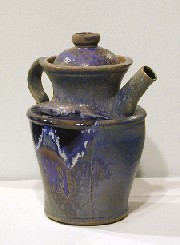Jars of Clay
Overseeing
three large tables filled with clay vessels Charles Hughes, a State College
potter, said he didn't make enough. The tables were abundantely covered with
beautiful, natural forms. But Hughes said he wasn't sure the pots would make
it through his festival tour this summer.
 The
Central Pennsylvania Arts Festival this year eased Hughes's concerns about not
having enough pottery for the season. Hughes, who has participated in the Arts
Festivals for three years, said sales have been marginal and that other artisans
have noticed the decreased business. According to Hughes, the number of people
appeared the same as in previous years, but they are not buying as much. Hughes
offered no theories on the change in sales trends. A customer walked-up and
asked Hughes why he wasn't selling lanterns like some other ceramists in the
festival. The customer, who told Hughes his prices were high, said the lanterns
were only $10. Hughes said he wouldn't consider making lanterns or selling them
for so little.
The
Central Pennsylvania Arts Festival this year eased Hughes's concerns about not
having enough pottery for the season. Hughes, who has participated in the Arts
Festivals for three years, said sales have been marginal and that other artisans
have noticed the decreased business. According to Hughes, the number of people
appeared the same as in previous years, but they are not buying as much. Hughes
offered no theories on the change in sales trends. A customer walked-up and
asked Hughes why he wasn't selling lanterns like some other ceramists in the
festival. The customer, who told Hughes his prices were high, said the lanterns
were only $10. Hughes said he wouldn't consider making lanterns or selling them
for so little.
Hughes is an artist not
interested in gimmicks. He said over the years people have approached him with
marketing ideas, like the lanterns. But he strives to keep his work pure and
honest.
Hughes's pottery clearly
reflects his values. In general, he attempts to communicate straightforwardness
and openness in his work. The honesty he srives for does manifest itself. Customers
walking by commented on the naturalness of his pottery. Hughes said he utilizes
clay's intrinsic qualities. His forms are not tricky; they speak for themselves.
When asked what forms he
prefers make, Hughes said bowls and pitchers come naturally to him. He prefers
glazes that are uncontrived and compliment his ceramic forms. Hughes steers
away from shiny glazes because they detract from the figure of a pot; he prefers
a matte glaze for its natural looking tendencies.
For Hughes, pottery production
is more than a livelihood. He said he believes there is a spiritual component
to using pottery that doesn't come off a production line. According to Hughes,
eating out of handcrafted pottery is a heightened experience because of the
human energy put into the production work. For Hughes, ceramics is more than
his business; it is his way of communicating with people.
Hughes also values the independence
of production work. He is aggressive in what needs to be done and enjoys answering
to himself. At this point, Hughes said, he would be a bad employee. For the
future, he can't imagine himself doing anything else.
by Amanda Cornwell (originally
published in the Penn State Forum Magazine)
 The
Central Pennsylvania Arts Festival this year eased Hughes's concerns about not
having enough pottery for the season. Hughes, who has participated in the Arts
Festivals for three years, said sales have been marginal and that other artisans
have noticed the decreased business. According to Hughes, the number of people
appeared the same as in previous years, but they are not buying as much. Hughes
offered no theories on the change in sales trends. A customer walked-up and
asked Hughes why he wasn't selling lanterns like some other ceramists in the
festival. The customer, who told Hughes his prices were high, said the lanterns
were only $10. Hughes said he wouldn't consider making lanterns or selling them
for so little.
The
Central Pennsylvania Arts Festival this year eased Hughes's concerns about not
having enough pottery for the season. Hughes, who has participated in the Arts
Festivals for three years, said sales have been marginal and that other artisans
have noticed the decreased business. According to Hughes, the number of people
appeared the same as in previous years, but they are not buying as much. Hughes
offered no theories on the change in sales trends. A customer walked-up and
asked Hughes why he wasn't selling lanterns like some other ceramists in the
festival. The customer, who told Hughes his prices were high, said the lanterns
were only $10. Hughes said he wouldn't consider making lanterns or selling them
for so little.